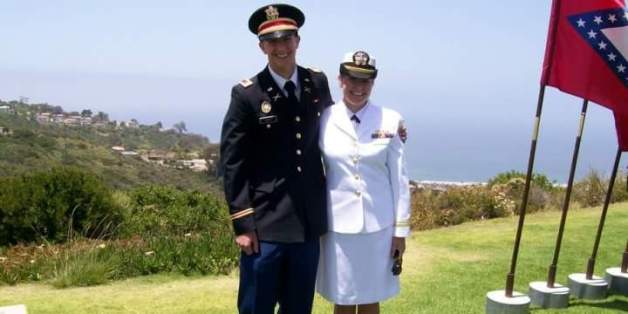Introduction to This Series, by Mary W Maxwell
There are at least two war-powers cases in appeals today. One is mine, Maxwell v. Trump (Case 18-1127) at the First Circuit, in Boston. The other is a fascinating one by Captain Nathan Smith at the DC Circuit Court in Washington, DC.. His case began as Smith v. Obama, but after the January 2017 Inauguration it was changed automatically to Smith v. Trump.
This series will include a review of some of the cases and principles, but to begin we are reprinting here an article published at Huffington Post by Erin Smith McAdams, the sister of Captain Nathan Smith. It first appeared in 2016 but was updated at Huffington Post on May 11, 2017. I should point out in all previous cases by soldiers, the soldier opposed the war (e.g., Vietnam). Captain Smith supports the war.
Here is Erin Smith McAdams’ article with its original title: My Brother’s Challenge to the Undeclared War Against ISIS
I come from a tradition of military service. My parents served full careers in the Navy. My grandfather served a career that included fighter missions during World War II; my grandmother served as a Navy nurse. I served four years as a naval officer, and my brother, Army Captain Nathan Smith, currently serves at command headquarters in Kuwait in the battle against the Islamic State. Military service is something that my family has never taken lightly.
Last week, Nathan sued President Obama, asking the federal courts to declare the war against ISIS illegal because Congress has failed to authorize it. He came to this decision only after intensive soul-searching and research, some of which I have been privy to over the past year. When Nathan got to Kuwait, it became clear to him within a few months that this was a very different situation than his previous deployment to Afghanistan in 2013.
He began calling me when he could and was soon expressing serious concern over the level of escalation and the fact that there seemed to be no end in sight to mission creep. He increasingly began to reflect on the meaning of his officer’s oath to “support and defend the Constitution of the United States against all enemies, foreign and domestic” — an oath that did not demand obedience to the commander-in-chief, but to the Constitution.
Our constitutional system of checks and balances safeguards the country against two evils — military dictatorship on one hand, autocracy on the other. It establishes a symbiotic relationship in which both the military and the political system rely on one another to carry out a complementary set of responsibilities.
Our elected politicians depend on the military to carry out the actions necessary to safeguard the country’s interests. The military, in turn, depends on elected representatives to ensure their directed actions comply with the Constitution. Such is our democracy.
This system breaks down when the political system fails to carry out its responsibility concerning the military’s mission. Our Constitution and the War Powers Act of 1973 make it quite clear that the President cannot deploy troops longer than 90 days without the authorization of Congress, no matter how morally justified the cause may be.
We have now been fighting ISIS for almost two years, with no end in sight. The President’s justification for this intervention is Congress’ authorization for a war in Afghanistan in response to 9/11. But ISIS didn’t exist at that time, and the current war is not in Afghanistan.
This puts conscientious military members in a very difficult situation: the President’s order to fight an unauthorized war requires them to violate their oath to “support and uphold the Constitution,” which by extension requires them to disobey orders that are unconstitutional. Herein lies the crux of Nathan’s case.
If our politicians believe the conflict against ISIS is important enough for people like Master Sergeant Joshua Wheeler, Staff Sergeant Louis Cardin, and Petty Officer 1st Class Charlie Keating to die for, then it is time for them to step up to the plate and authorize the war.
What it is not time to do is to expect military members to unquestioningly follow orders that violate their oath to the Constitution simply because the political process is difficult and unwieldy. Members of the military put their lives at risk every day to perform the missions handed to them by politicians. The least politicians can do is approve these missions as required by law.
But if it is Congress that must authorize the war, why is Nathan suing the President rather than Congress? After all, President Obama has proposed an updated AUMF that is specific to the current conflict; Congress failed to act upon it. The answer is simple: Nathan’s orders do not come from Congress; they come from the President, his commander-in-chief.
While it is good that the President has acknowledged the need for a new AUMF, the Constitution and the War Powers Resolution place the burden on him to get Congress to agree. By continuing to issue potentially unconstitutional orders to the military in the absence of an AUMF, President Obama is essentially passing the buck to conscientious military service members.
Congress must also fulfill its obligations, however. If this suit causes members of Congress to finally take action in providing the military with a clear and updated AUMF for the current conflict, I know Nathan will consider his actions a success.
This is an issue that transcends partisan politics. If the President and Congress allow this situation to continue, they will be setting a very dangerous precedent. A few months back, Donald Trump was asked what he would do if the military refused to follow orders requiring them to torture or target civilians — orders that are indisputably unlawful.
His reply showed a frightening contempt for the responsibilities imposed by the military oath of office: “If I say do it, they’re going to do it.” This type of thinking — that our uniformed service members are mindless automatons who are willing to carry out all presidential orders, regardless of legality — could have devastating consequences when combined with unchecked executive war-making power.
We cannot change the dangerous assumptions of presidential candidates. This case, however, challenges Americans to address something that is within our control: we should insist that our representatives stop punting a constitutional dilemma to our military members by putting a decisive halt to America’s slide down the slippery slope of unilateral executive war-making.
In bringing this lawsuit, Nathan has knowingly put his Army career in jeopardy. If his fellow citizens back him up, I hope that his sacrifice will help redeem this nation’s commitment to the Constitution as the organizing principle of our democracy.
— Erin Smith McAdam is a professional musician residing in the San Francisco area































An interesting conundrum. Declaring war on an organisation that you’re funding.
Nathan and Erin can now move on to the “no standing army bit”
Yes, Simon, that would be wonderful if they would sue over the funding of a US army for more than 2 years.
Article I, section 8, clause 12:
“The Congress shall have power … To raise and support armies, but no appropriation of money to that use shall be for a longer term than two years.”
I meant them personally and leave the forces. I’m a bit sus (as usual) on this. These educated people ( fine school, officer training – assumption) somehow found the constitution later in life, wonderful. Afghanistan had no mission creep (what!), tell us about the poppy fields Nathan, you had the clearance to watch the surveillance feeds protecting them. When you form a militia at home to do your duty, I will apologise.
Whats the psyop ?
Off topic, excuse me:
New York Times June 16, 2018
By Jeffery C. Mays
The Boston Globe suspended its columnist Kevin Cullen for three months without pay on Friday after a review found fabricated details and inconsistencies in comments he made in radio interviews and at public appearances about the Boston Marathon bombings.
“Our review leads us to a conclusion that Mr. Cullen damaged his credibility,” John W. Henry, The Globe’s publisher, and Brian McGrory, its editor, wrote in a statement. “These were serious violations for any journalist and for The Globe….”
On Topic
.
https://www.youtube.com/watch?v=Cpfo1p2dpag
I congratulate Captain Nathan Smith for his stand. Unfortunately I don’t think his case will even be allowed to be heard in court. Politicians in the Western World, at least, don’t take any notice of their country’s Constitution. They are a “Law” unto themselves, to serve the Cabal, centred in the City of London. The people have no rights or working Constitution to protect them.
The judiciary that is in place to guarantee that the Constitution is being used to govern by, is as corrupted as the political system.
Actually his case has been heard in court, Mal. After the district court dismissed him, he appealed. A Yale law prof Bruce Ackerman is on the case. There was oral argument a few months ago.
He is now out of the army but has a year of standby duty left to go. i suppose they will let the case percolate til he is out and then deny it on the grounds of mootness. As in “No longer any need.”
By the way, if I die would some US citizen please make a copycat case. Upon death the case ends.
And no, I can’t get friends to join the case with me now, as it is a pro se deal (no attorney) and that means “for himself”. They don’t have a category of “for themselves.”
Adding this on Sept 8, 2024: The above comment contained a boo-boo. You CAN do a pro se filing as a group. Zorry.
We only have to go back to when Obama’s right to take up the position as President of the US was to be challenged in the Court, as to his requirement to being “a natural born citizen of the US”. Each judge went against his oath to uphold the Constitution, by making a silly statement that each, applicant to be heard, had “no standing”. If a legal citizen of the US had “no standing”, who does have standing to uphold the law?
In my opinion, each of those justices should have been charged with treason. Instead, if in the future a similar situation arises, I would suggest that it will now be said, that “a precedence has been set” making any future similar ruling legal.
“In my opinion, each of those justices should have been charged with treason. ”
I like it, Mal. I like it.
[…] and analysing them. The second-most recent case is the 2016 filing by Captain Nathan Smith (see Part 1). The most recent case is mine, as far as I am aware. Case number […]
Sadly the Smith case has ended in farce. The three-judge panel took NINE MONTHS to issue a ruling, waiting just long enough for Captain Smith to leave the Army. They then had the cheek to use that departure as part of their rationale for why the case had “become moot” and should now be dismissed.
You can read their judgement at:
https://www.cadc.uscourts.gov/internet/judgments.nsf/8AE2C2A7A04EBB37852582C60048B4FA/$file/16-5377-1739787.pdf